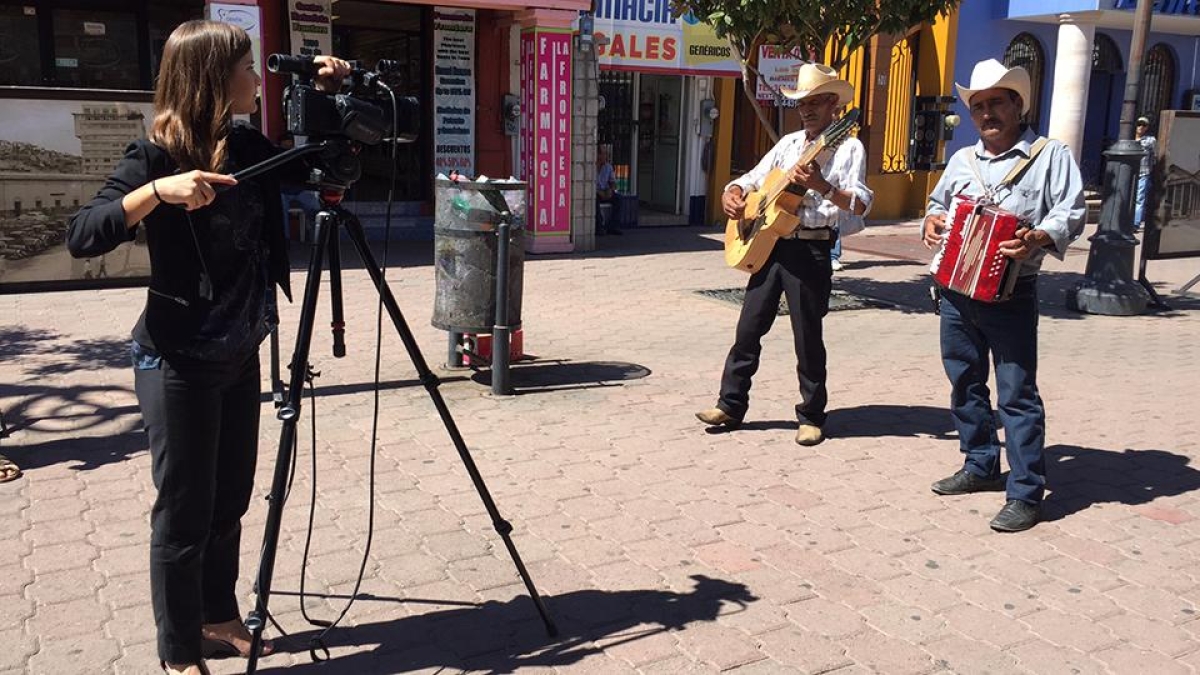ASU Cronkite School launches new Spanish-language journalism platform

Bilingual Cronkite students are reporting in Spanish for Cronkite Noticias/Mixed Voces, a new digital Spanish-language journalism platform for issues critical to Arizonans.
Arizona State University’s Walter Cronkite School of Journalism and Mass Communication has launched Cronkite Noticias/Mixed Voces, a new digital Spanish-language platform for reporting on issues critical to Arizonans.
The new multiplatform website — cronkitenoticias.org — focuses on the economy, education, sustainability, immigration and other issues important to the region’s Latino communities. It is made possible by the Raza Development Fund, the largest Latino community development financial institution dedicated to generating economic growth and opportunities for Latino families across the country.
Cronkite Noticias/Mixed Voces is the successor of Mixed Voces, a pilot project established by RDF in 2014 to provide news and information to Arizona’s Spanish-speaking community. The project succeeded in bringing 35,000 monthly visitors to MixedVoces.com. RDF then gifted the Mixed Voces website and seed money to the Cronkite School to hire a professional editor to support the website and mentor students.
“Cronkite Noticias/Mixed Voces will provide a very important service to Spanish-speaking Arizonans as well as our bilingual journalism students,” said Christopher Callahan, dean of the Cronkite School. “We greatly appreciate the support of the Raza Development Fund in helping us make this initiative a reality.”
Cronkite Noticias is the latest addition to Cronkite News, the news division of Arizona PBS where students get real-world journalism experience working under the guidance of Cronkite School faculty members with extensive professional experience.
Veteran bilingual multimedia journalist Valeria Fernández took over leadership of Cronkite Noticias earlier this month on an interim basis. She is working with a team of six bilingual Cronkite students to produce a variety of in-depth, Spanish-language news content for the website.
Fernández also works as a freelance journalist, having reported for CNN Español, CNN International, Radio Bilingue, PRI's The World, Al Jazeera English, New America Media and The Associated Press. She was named Latina Journalist of the Year by the National Association of Hispanic Publications in 2004.
“I'm honored to be part of a pioneering team of brave ‘reporteros’ who are undertaking the challenge of not only producing news in Spanish, but creating bilingual and multimedia enterprise reports that will serve our community,” Fernández said. “Cronkite Noticias will follow a tradition of community journalism that comes from our predecessor Mixed Voces. Both our website and our Spanish newscast will go beyond the breaking news to deliver shoe leather, in-depth journalism to Latino and Spanish-speaking audiences.”
The Cronkite Noticias team also will collaborate with Cronkite News – Borderlands, in which students cover immigration and border issues under the direction of veteran journalists Angela Kocherga and Alfredo Corchado, both Southwest Borderlands Initiative professors at the Cronkite School.
Cronkite senior Johana Restrepo, who was born in Colombia, South America, and moved to the U.S. at the age of 9, said she grew up with Spanish-language media. “I grew up watching Telemundo and Univision, and I always looked up to those reporters,” Restrepo said. “I wanted to be like them when I was a little girl.”
Now, as a member of the inaugural Cronkite Noticias team, she is reporting stories such as one on the city of Phoenix’s move to issue ID cards to undocumented immigrants.
“The Spanish-speaking community is very big, and it’s an honor to be a part of this,” she said.
Cronkite Noticias/Mixed Voces is one of 13 professional immersion programs at the Cronkite School. The others are a nightly television news broadcast that airs on Arizona PBS, digital news bureaus in Washington and Phoenix, sports bureaus in Los Angeles and Phoenix, a strategic public relations agency, an entrepreneurial digital innovation lab, a business reporting bureau, a borderlands bureau, a digital production bureau, an audience engagement and civic journalism bureau and a national investigative reporting program.
Established in 1999, the Raza Development Fund is a nonprofit corporation and a registered community development financial institution under the U.S. Department of the Treasury. It provides National Council of La Raza affiliates and other Latino-serving organizations access to capital.
With more than $250 million in total assets under management, RDF is the largest Latino community development financial institution in the country. Since its inception, it has provided capital to Latino- serving organizations nationwide. These organizations have received technical assistance and loans that have helped leverage nearly $2.5 billion in private capital for education, childcare, affordable housing and health care projects serving low-income families and individuals.
More Law, journalism and politics

A new twist on fantasy sports brought on by ASU ties
A new fantasy sports gaming app is taking traditional fantasy sports and mixing them with a strategic, territory-based twist.…

'Politics Beyond the Aisle' series to explore the stories of public officials
In an effort to build a stronger connection between students and political and civic leaders, Arizona State University’s School…

ASU committed to advancing free speech
A core pillar of democracy and our concept as a nation has always been freedom — that includes freedom of speech. But what does…

